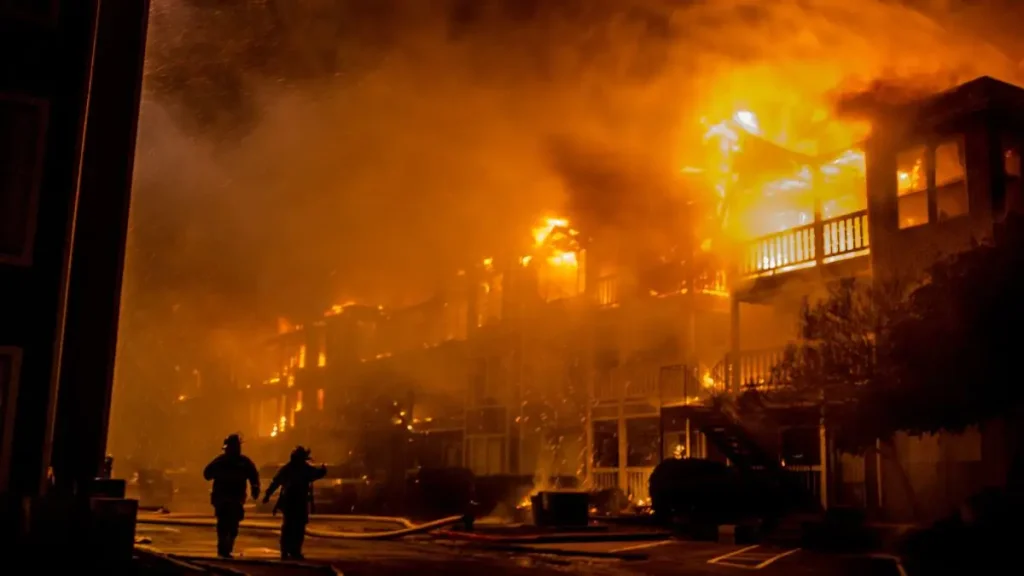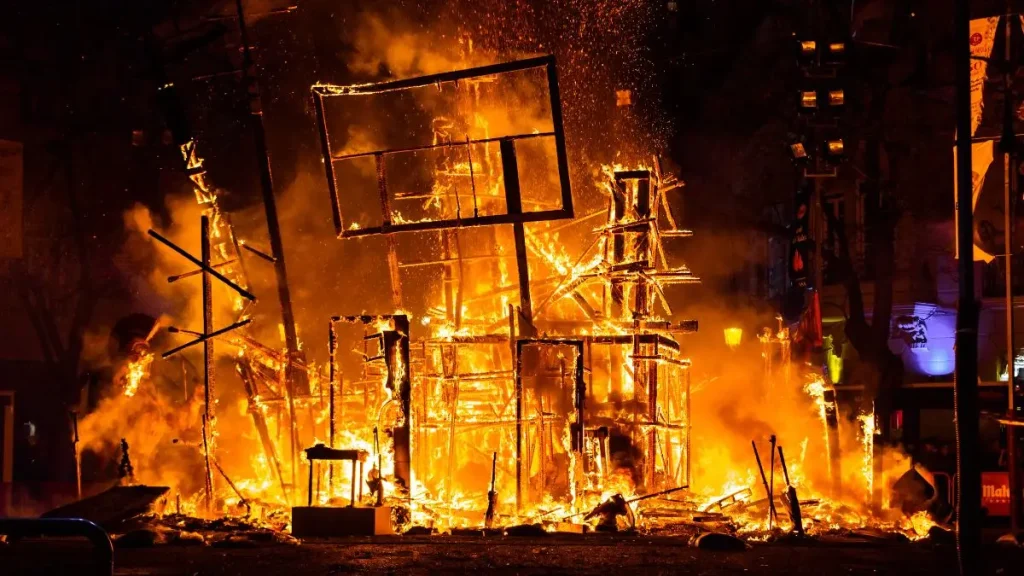Homes in Douglas County Damaged After Fireworks Incident
I don’t need to tell you how dangerous fireworks can be—but what happened across metro Denver over the weekend was a harsh reminder.
Three separate house fires, all within hours of each other. All caused by fireworks. And all entirely preventable.
One home in Douglas County nearly lost everything after used fireworks were tossed into a plastic trash can. In another case, a rooftop deck caught fire after a stray firework landed on it—right before the home was about to be sold. And a third fire in Littleton sent firefighters racing to stop it from spreading into the attic.
This wasn’t just some backyard fun gone wrong. These were families, pets, and properties put at serious risk—some losing cars, bedrooms, garages. Four deputies were treated for smoke inhalation while helping a family get out of their home. Thankfully, no lives were lost.
But here’s the real issue: this keeps happening every Fourth of July. And unless we talk about what went wrong—not just what happened—we’ll see it again next year.
If you live in Denver or the surrounding counties, this story isn’t just news. It’s a warning.
Let’s break down what exactly happened, what caused it, and what you need to know if you want to keep your home (and your neighbors’) safe.
What Really Happened Across Denver Last Night?
Let me walk you through what went down—it wasn’t just one house fire. It was a series of back-to-back incidents that stretched from Douglas County to Littleton to Sloan’s Lake.
First, in the Stonegate neighborhood of Douglas County, fireworks that were thrown into a plastic trash can re-ignited and set a garage on fire. Flames spread fast—damaging the upstairs bedroom, burning a car parked inside, and nearly trapping a family still inside.
Then, just an hour later, a house in Littleton caught fire. Fire crews had to rip through ceilings to stop the flames from spreading through the attic.
And if that wasn’t enough, a third fire was reported at Sloan’s Lake, where a real estate agent says a firework landed right on a home’s rooftop deck—a house her client was about to buy.
This isn’t some random bad luck. This is what happens when we treat fireworks casually.
According to 9News, officials believe all three fires were tied directly to improperly discarded fireworks.
You and I both know how common fireworks are around the 4th of July—but after this? It’s clear we need to treat them with a lot more respect.
The Douglas County Fire – Deputies Risked It All to Save a Family and Their Pets
If you’ve ever had to choose between grabbing your pets or saving yourself—you’d get what this family went through.
A little after midnight, deputies and firefighters showed up to a house on Pebblewood Court. The garage was on fire, and the flames were starting to climb toward the second floor.
Inside the house? The family was still trying to get their dog and two cats to safety.
I don’t blame them. In that moment, panic takes over. But what happened next is why this story matters.
Four deputies rushed in, pulled the family out, and helped rescue all the pets. They didn’t even wait for backup—they just went in.
That kind of bravery comes with risk. According to the Douglas County Sheriff’s Office on X, all four deputies were treated on the scene for smoke inhalation. Thankfully, they’re okay.
🚨 Fireworks Safety Reminder 🚨
— DC Sheriff (@dcsheriff) July 5, 2025
Early this morning, #DCSO deputies and @SouthMetroPIO responded to a house fire on Pebblewood Court in the Stonegate neighborhood. The fire started outside the garage after used fireworks were discarded in a plastic trash can.
Deputies arrived to… pic.twitter.com/R1HrIbzYW1
The fire? It tore through the garage, destroyed a vehicle, and heavily damaged a bedroom upstairs. All because someone thought a plastic trash can was a safe place for used fireworks.
If you’ve ever tossed a firework thinking it’s done—this is your reminder: embers can reignite even hours later.
Littleton Fire – Another Garage, Another Warning
This wasn’t just a one-time mistake. Less than an hour after the Douglas County fire, South Metro Fire Rescue was called to another house—this time in Littleton, on South Crocker Way.
Same story, different house.
Garage on fire. Smoke spreading into the attic. Firefighters had to cut open the ceiling across multiple rooms to stop the flames. And yeah—fireworks were to blame here too.
Police got everyone out safely, and fire crews found and rescued a cat trapped inside. But let’s be honest—you shouldn’t need that many near-misses in one night to know something’s off.
If you’re lighting fireworks near your home, or tossing used ones in the trash, this is what you’re gambling with: your family’s safety, your pets, and your house.
You deserve a celebration—not an evacuation.
Similar to a recent case in Nantucket, where an overnight blaze forced a family to evacuate within minutes, this fire shows how fast situations can turn dangerous.
Sloan’s Lake Scare – A Rooftop Deck Fire Just Before Closing

You ever hear about a fire ruining a real estate deal? That’s exactly what happened here.
Katie Portenga, a Denver-based realtor with Coldwell Banker, was in the middle of closing a sale when her client’s future home got hit by fireworks. According to her, a firework landed directly on the rooftop deck.
That’s it. No trash can, no open flame, no careless storage. Just one firework, landing in the wrong spot.
That’s how sensitive some homes are to fireworks. Especially in a city where homes are packed close together and wood decks are common.
Now imagine you’ve just signed the papers, and the next morning your “dream home” smells like burnt wood and melted siding.
It’s a chilling reminder that even homes not being lived in are still at risk if fireworks are fired recklessly.
We’ve also seen a growing conversation about fire safety in communities across Denver and beyond. If you want real-time updates, safety reminders, and urgent alerts during fire season, many folks are joining dedicated local safety groups on WhatsApp for quick, verified information.
What’s Actually Causing These Fires? It’s Not Just Fireworks—It’s What You Do After
Let me be real with you—fireworks don’t just explode and disappear. They leave behind embers that can stay hot for hours.
And that’s the part most people overlook.
In the Douglas County case, the used fireworks were dumped into a plastic trash bin. And plastic? It melts fast. Once it started melting, the flames spread to the garage, and everything went downhill from there.
The Douglas County Sheriff’s Office posted a very clear warning:
“Please remember: Fireworks may look harmless when extinguished, but leftover embers can reignite.”
If you’ve ever thought, “It’s just cardboard and ash, what’s the big deal?”—this is your answer. The big deal is house fires, destroyed cars, displaced families, and emergency responders risking their lives.
You and I need to stop thinking that the danger ends when the firework fizzles out. The real risk often starts after the show ends.
Similar chaos unfolded in Los Angeles this year, where active fireworks triggered a massive multi-home blaze on the Fourth of July.
Fire Crews Were Overwhelmed — 90 Emergency Calls in Just 12 Hours
You’d expect fire departments to be busy on July 4th, right? But this year was different. And not in a good way.
West Metro Fire Rescue, which normally handles around 110 calls in 24 hours, got 90 calls in just half that time.
That’s not just “busy.” That’s overloaded.
South Metro Fire Rescue wasn’t far behind—they dealt with at least 16 brush fires overnight. Most of them were tied to—you guessed it—fireworks.
Think about that for a second. While you were enjoying the fireworks show, firefighters were scrambling all over the metro—putting out flames, cutting into attics, saving pets, and treating smoke inhalation.
These aren’t just numbers. They’re signals.
Denver’s fire services were stretched thin—all because of preventable mistakes.
So next time someone says, “It’s just a few fireworks,” show them this.
Have you seen fireworks causing issues in your own neighborhood? Drop a comment below — we’d love to hear your experience or any steps your community is taking to stay safe.
Were These Fireworks Even Legal? And Will Anyone Be Fined?
Now you might be wondering—if these fires were caused by fireworks, were they even allowed in the first place?
Here’s the thing: laws around fireworks vary across the Denver metro. In many places, only “safe and sane” fireworks are allowed. That usually excludes anything that flies or explodes.
But even “legal” fireworks can be dangerous if they’re mishandled or improperly thrown away—like what happened in Douglas County.
As for citations? According to Douglas County Sheriff’s Office, no one was cited—yet. Their focus was on rescue, not punishment. But that doesn’t mean consequences are off the table.
If you cause a house fire—even by accident—you could be liable for damages, insurance claims, or worse.
Bottom line? Just because fireworks are sold near you doesn’t mean they’re safe to use—or even legal to use in your neighborhood.
Even seemingly small ignition sources—like a propane torch—have led to full-blown house fires, as seen recently in Michigan.
How to Safely Dispose Fireworks – A Public Safety Checklist

If you want to prevent what happened in Denver, follow these simple but critical disposal steps:
- Soak all used fireworks in a bucket of water for at least 12 to 24 hours before throwing them away
- Never place used fireworks in plastic trash cans or bins
- Use a metal container with a lid if you need to store used fireworks temporarily
- Keep any spent fireworks far from your home, wooden decks, fences, or dry grass
- After your firework celebration, walk the area and clean up all debris to prevent accidental flare-ups
- Store unused fireworks in a cool, dry place, away from ignition sources
These small steps can make the difference between a safe night and a house fire.
What to Do If Fireworks Damage Your Home?
If your property is affected by fireworks—whether it’s your own or a neighbor’s—here’s what to do next:
- Take clear, timestamped photos and videos of all visible damage, both inside and outside
- Save any fire department or police reports related to the incident
- File a claim with your homeowners insurance provider as soon as possible
- Provide details about how the fire started, who was involved, and the time of incident
- Contact your local fire department for an official incident report
- Avoid cleaning or repairing anything structural until it’s safe and properly assessed
- Ask your insurance company if temporary housing or emergency expenses are covered
- Save receipts for any emergency repairs, cleanup, or hotel stays for reimbursement
Quick action helps protect your claim and speeds up the recovery process.
Final Thoughts
What happened in Denver wasn’t just an accident—it was a warning. When fireworks are misused or poorly discarded, the consequences are fast, destructive, and very real. Whether you’re celebrating or just watching from a distance, safety isn’t optional—it’s your responsibility.
Let’s not wait for the next fire to learn the lesson.
For more real incidents and safety tips around home fires and fire prevention, visit our website Build Like New.
Disclaimer: This article is for informational purposes only and should not be taken as legal or safety advice. Please consult local fire authorities or your insurance provider for specific guidance. All incident details are based on publicly available reports at the time of writing.


